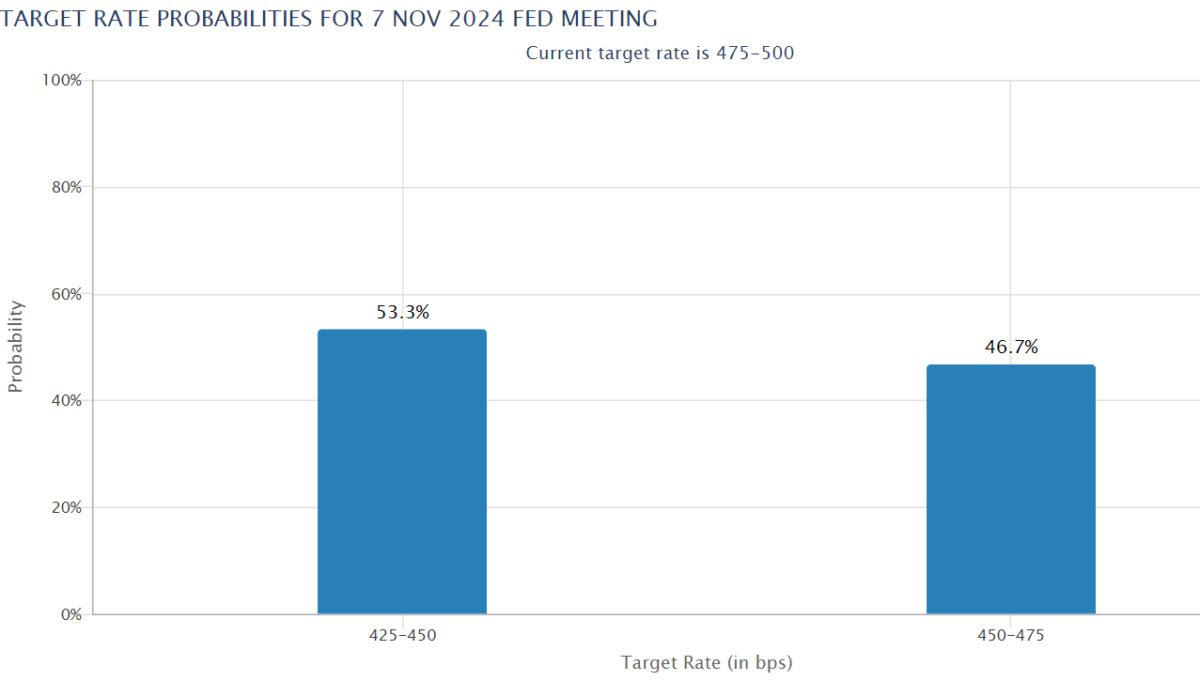Bitcoin (BTC) is edging closer to the $70,000 milestone after retesting $66,000 on Friday. This comes after a softer-than-expected reading from the U.S. Federal Reserve’s preferred inflation measure—the Core PCE Index (Personal Consumption Expenditures). This index tracks inflation while excluding the more volatile components of food and energy prices.
Fed’s focus shifts to the labor market, boosting BTC’s prospects
The August Core PCE index showed a 2.6% year-on-year increase, slightly below the anticipated 2.7%. The lower-than-expected inflation figure lifted market sentiment, with speculators factoring in the possibility of a 50 basis point (bps) rate cut by the Federal Reserve in November.
The lower inflation data suggests that the Fed’s next focus will be the U.S. labor market, particularly unemployment rates, which will influence the pace of future interest rate cuts. According to QCP Capital, a trading firm, labor market updates will be critical in determining the market’s direction.
In a weekend report from 28 September, QCP Capital stated:
“As we move into next week, the key focus will be on upcoming labor market indicators, including JOLTs, ADP, and the U.S. unemployment rate.”– QCP Capital
The most anticipated updates are the Job Openings and Labor Turnover Survey (JOLTs), and the U.S. employment report, scheduled for release on 1 and 4 November, respectively. QCP Capital projected that strong labor metrics could strengthen the case for a 50bps rate cut in November, which would likely boost risk assets.
If this happens, Bitcoin could continue its upward trajectory toward $70,000, especially after reclaiming its 200-day moving average (MA).

Ethereum navigates mixed signals amid Bitcoin comparisons
When analyzing Ethereum, it is critical to first compare its performance to Bitcoin (ETH/BTC). The ETH/BTC pair has fallen below the 0.04 barrier, indicating a shift in viewpoint. Historically, when ETH/BTC falls, it tends to bottom within 8-10 weeks.
However, market analyst Benjamin Cowen warns of conflicting signals. For example, ETH/BTC previously bottomed when the Federal Reserve shifted from quantitative tightening (QT) to quantitative easing (QE), a move that has yet to occur.
Despite these mixed signals, the market rally could also benefit Ethereum (ETH), which has outperformed Bitcoin since the Fed’s policy shift. A further macroeconomic tailwind could extend ETH’s strong recovery. Market analyst Benjamin Cowen suggests ETH could reach the $3,000 psychological level. Presently, Ethereum (ETH) is trading at $2,677 after a substantial 10% rally over the past week.
 Source: Cowen/X
Source: Cowen/XMeanwhile, U.S. investors have renewed interest in top digital assets. BTC exchange-traded funds (ETFs) saw $1.11 billion in inflows this week, the largest since 19 July. ETH ETFs also attracted $84.6 million, marking the highest weekly inflows since 9 August. If this trend persists, the $70,000 BTC and $3,000 ETH price targets could be within reach.
Source link







